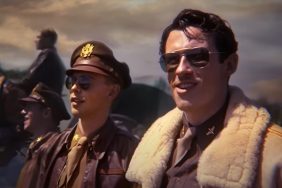Cast:
Brad Pitt as Lt. Aldo Raine
Mélanie Laurent as Shosanna Dreyfus
Christoph Waltz as Col. Hans Landa
Eli Roth as Sgt. Donny Donowitz
Michael Fassbender as Lt. Archie Hicox
Diane Kruger as Bridget von Hammersmark
Daniel Brühl as Fredrick Zoller
Til Schweiger as Sgt. Hugo Stiglitz
Gedeon Burkhard as Cpl. Wilhelm Wicki
Jacky Ido as Marcel
B.J. Novak as Pfc. Smithson Utivich
Omar Doom as Pfc. Omar Ulmer
August Diehl as Major Dieter Hellstrom
Denis Menochet as Perrier LaPadite
Sylvester Groth as Joseph Goebbels
Martin Wuttke as Adolf Hitler
Mike Myers as General Ed Fenech
Julie Dreyfus as Francesca Mondino
Richard Sammel as Sgt. Werner Rachtman
Alexander Fehling as Master Sgt. Wilhelm / Pola Negri
Rod Taylor as Winston Churchill
Soenke Möhring as Pvt. Butz / Walter Frazer
Samm Levine as PFC Gerold Hirschberg
Paul Rust as PFC Andy Kagan
Michael Bacall as PFC Michael Zimmerman
Arndt Schwering-Sohnrey as German Soldier / Winnetou
Petra Hartung as German Female Soldier / Beethoven
Volker Michalowski as German Soldier / Edgar Wallace
Ken Duken as German Soldier / Mata Hari
Directed by Quentin Tarantino
Summary:
Watching WWII through the eyes of Quentin Tarantino is infinitely more fun than the real thing; the results are unforgettable.
Story:
Once upon a time in German-occupied France, 1944, a group of Jewish-American soldiers led by Lieutenant Aldo Rayne (Brad Pitt) are taking it to the Nazis, killing and scalping any of the unlucky ones who end up in their path. Rayne’s “Basterds” are commissioned to take part in a plan by British Intelligence to destroy a movie theater where Germany’s top officers are meeting to attend the premiere of Joseph Goebbel’s latest propaganda movie. Meanwhile, the owner of the theater, a Jewish woman named Shoshana (Mélanie Laurent) is planning her own revenge against the Nazis for killing her entire family years earlier.
Analysis:
The thought of Quentin Tarantino making a WWII movie might fill anyone, fan or detractor, with equal amounts of curiosity, excitement and sheer dread, and all of those emotions are equally deserved by “Inglourious Basterds,” an anthology film with a number of interrelated storylines that come together in the type of explosive climax Tarantino excels at.
From the very opening credits, one realizes that Tarantino is no longer paying tribute to midnight B-movies or “grindhouse” fare, instead trying to create a film that could play in any arthouse alongside European films from the ’60s, while maintaining all the humor and violence and characterization that his fans expect. The opening segment is essentially a 20-minute dialogue scene between a French farmer and a Nazi S.S. agent named Hans Landa, known as “The Jew Hunter” for his tenacity at finding Jews in hiding. Their conversation starts out pleasant enough before turning into a shocking display of violence. Without question, many of the accolades for Tarantino’s latest will be heaped on German actor Christoph Waltz, who in Landa creates the most delightfully diabolical baddie of the year–a performance sure to get him awards attention.
Before you can recover from what you just experienced, Chapter 2: “Inglourious Basterds,” introduces us to Lt. Aldo Rayne and his band of Jewish-American misfits, the most prominent one being his second-in-command Sgt. Donny Donowitz, whose reputation as “The Bear Jew” has spread far and wide due to his penchant for beating Nazis to death with his baseball bat. The third chapter changes direction once again, returning to a French woman introduced in the opening segment who years later is running her aunt’s movie theatre with her projectionist boyfriend Marcel. She captures the eye of a German private (Daniel Brühl), a bold war hero who is both subject and star of Joseph Goebbels’ latest epic, a movie the enamored young man wants to premiere at this pretty young woman’s theater.
“Basterds” could easily be seen as a cross between a war movie and a Holocaust film with elements of both without necessarily being either. As a war movie in which the Jews fight back, it succeeds at many of the things at which Edward Zwick’s “Defiance” faltered, since it’s not so worried about remaining true to historical facts or the Hollywood tropes that normally come with both genres. You immediately realize this when Adolf Hitler first appears. Rather than being the German dictator as made famous in newsreels, this is Tarantino’s own incarnation, a caricature more like the one portrayed in American comics during WWII.
Tarantino has once again assembled one of the most eclectic and esoteric casts you could imagine, but it’s an ensemble to die for as every single character gets their moment to step forward and shine from Brad Pitt’s comical Lt. Aldo Raine to key roles played by lesser known actors like Mélanie Laurent, an amazing discovery who is amazing as the French theater owner. It’s somewhat amusing to know two of Raine’s Basterds are played by filmmakers in their own right. Til Schweiger’s Sgt. Hugo Stiglitz rightfully get his very own violent flashback montage, while Eli Roth goes a little over the top with his portrayal of Donowitz. The plan to take down the Nazis and end the war comes together with the introduction of Michael Fassbender’s Lt. Archie Hicox, a British officer whose experience as a film critic specializing in German cinema makes him the perfect candidate to infiltrate the premiere as the guest of German actress Bridget von Hammersmark (Diane Kruger).
Tarantino seems to relish the opportunity to play in uncharted territory and pay homage to his cinematic idols, in one scene clearly channeling Hitchcock. Yet the entire movie feels like classic Tarantino whether it’s the ubiquitous gun stand-offs, the profanity-laced dialogue or the graphic violence. He’s clearly evolved into a filmmaker who no longer gives a f*ck what critics and detractors think, and he has found a production team who go out of their way to help him achieve his vision. What other filmmaker has the audacity to use David Bowie’s “Cat People” in a WWII period piece and yet, make it work perfectly? That’s just one of the moments that goes completely against any rhyme, reason or rule of filmmaking, a strange choice that might confuse some, but it’s also the type of idea that could only come from the mind of Tarantino, who has the gumption to try something unconventional and go with it if it works.
Knowing all the players involved in this intricate story doesn’t detract from enjoying how it unfolds, even when it seems like Tarantino is deliberately trying to test his viewers’ patience, like with an extended dialogue scene in a basement bar that piles layers of tension atop each other before culminating in the inevitable. It’s a valid criticism to say the movie is somewhat long, the middle third feeling particularly drawn out, but the last act certainly delivers on everything that’s built up over the previous two hours, making it the type of movie you’ll want to see again just to see how brilliantly all the pieces fit together.
The Bottom Line:
This is Tarantino’s most intricate and involving piece of cinema in years, delivering a slow build that literally explodes in the last act. Despite Tarantino being first and foremost an auteur filmmaker, he’s one who realizes that an audience needs to be entertained at all times, which is why this is a terrific film, right up there with some of Tarantino’s earlier classics. That is, as long as you don’t go in expecting this to be a “Brad Pitt movie.”










